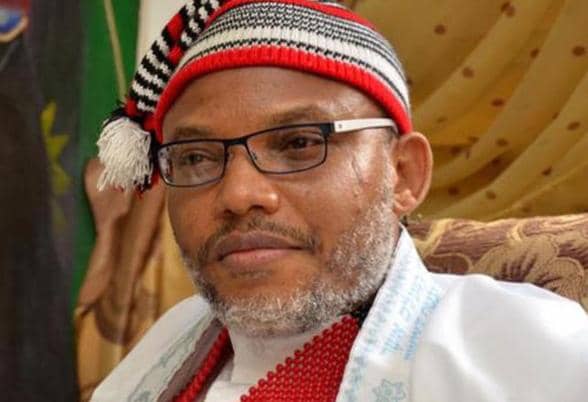Paragraph 1: The Resumption of Nnamdi Kanu’s Trial and Key Background
The long-awaited trial of Nnamdi Kanu, the leader of the Indigenous People of Biafra (IPOB), a separatist group advocating for an independent Biafran nation, resumed on Tuesday at the Federal High Court in Abuja. Kanu faces seven counts of terrorism brought against him by the Federal Government. This trial follows a complex legal trajectory, including an initial arrest in 2015, bail granted in 2017, subsequent flight to the UK, re-arrest in Kenya in 2021, and a series of legal battles involving charges being dropped, reinstated, and appeals to both the Court of Appeal and the Supreme Court. The Supreme Court’s December 2023 ruling directing Kanu back to trial on the remaining seven counts set the stage for the current proceedings.
Paragraph 2: Security Concerns and Witness Protection Measures
Acknowledging the sensitive nature of the case, the prosecution, led by Adegboyega Awomolo (SAN), requested that the identities of witnesses be protected. The court granted this request, allowing witnesses to testify from behind a screen, ensuring their anonymity while still allowing Kanu to observe them. Kanu’s defense team, a formidable group led by Kanu Agabi (SAN) and including four other senior advocates, did not oppose this protective measure, instead focusing their efforts on securing Kanu’s bail. This delicate balance between security concerns and the defendant’s right to a fair trial highlights the complex legal and political landscape surrounding the case.
Paragraph 3: Testimony of the First Prosecution Witness and Evidence Presented
The trial began with the testimony of Mr. A.A.A., an 18-year veteran of the Department of State Services (DSS). Testifying behind a screen, Mr. A.A.A. recounted the details of Kanu’s arrest at the Golden Tulip Hotel in Lagos in 2015. The DSS, acting on intelligence, initially encountered difficulty locating Kanu, as hotel staff denied his presence. Persistence, including a room-to-room search authorized by their director, led to Kanu’s discovery in Room 303, accompanied by a woman named Maria Ibezimakor. The witness described Kanu’s resistance during the arrest, alleging he head-butted an officer.
Paragraph 4: Seizure of Broadcasting Equipment and Other Incriminating Materials
The DSS search of the hotel room unearthed a significant find – a room outfitted as a broadcasting studio, complete with an array of equipment. Four suitcases filled with laptops, flash drives, microphones, mixers, pamphlets, and other materials allegedly linked to IPOB activities were brought to court as evidence. Kanu, during interrogation, admitted ownership of these items, further strengthening the prosecution’s case. The discovery of this makeshift studio provides a crucial link between Kanu and Radio Biafra, the platform allegedly used to disseminate pro-Biafra sentiments and potentially incite unrest.
Paragraph 5: Unraveling the Details of Kanu’s Stay and Subsequent Interrogation
Mr. A.A.A.’s testimony revealed further intricacies surrounding Kanu’s stay at the hotel. Kanu had checked in under the alias "Nwannekaenyi Ezebuiro," while his actual passport, bearing the name “Okwu-Kanu Nwannekaenyi Nnamdi Ngozichukwu,” was only retrieved from the hotel management the following day. Adding another layer of complexity, two additional women were found in a separate room booked under the same alias. The DSS also played a recording of Kanu’s interrogation, where he acknowledged his involvement in the struggle for self-determination and his establishment of Radio Biafra, admitting he had not registered the station with the National Broadcasting Commission.
Paragraph 6: Kanu’s Defense and Adjournment of the Trial
In the recorded interrogation, Kanu maintained his commitment to non-violent methods in pursuit of self-determination, referencing the United Nations Charter’s recognition of this right. He emphasized that he had never engaged in violent activities and highlighted that his initial interrogation was conducted without legal representation, a violation of his rights. The court admitted both Kanu’s written statement from 2015 and the video recording of his interrogation into evidence. The proceedings were adjourned until May 2nd, allowing time for the defense to cross-examine Mr. A.A.A. and to hear from the second prosecution witness. This adjournment marks a pause in what promises to be a closely watched and potentially protracted legal battle.














